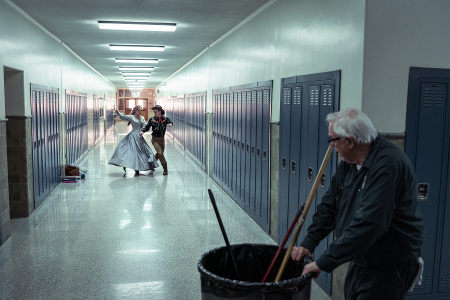Môsô dairinin
366 Weird Movies may earn commissions from purchases made through product links.
DIRECTED BY: Satoshi Kon
FEATURING: Voices of Mamiko Noto, Shouzou Iizuka, Toshihiko Seki, Haruko Momoi (Japanese); Michelle Ruff, Michael McConnohie, Liam O’ Brien, Carrie Savage (English dub)
PLOT: Toy designer Tsukiko Sagi, under tremendous pressure after creating an enormously successful character “Maromi,” is attacked by a bat-wielding boy on skates—dubbed “Li’l Slugger” (or “Shonen Bat”)—or so she claims. The two detectives assigned to the case have their doubts, but more attacks occur, and the victims appear to be connected, and all under some type of mental distress.

WHY IT MIGHT JOIN THE APOCRYPHA: “Paranoia Agent” balances horror and humor adroitly, especially when seen from a perspective 20 years later. Aside from some minor points, the series doesn’t feel dated; it could have been generated within the past seven years. The credit sequence establishes the tone, with the main characters laughing hysterically despite their incongruous settings (underwater, in traffic, and before an atomic explosion, to name a few), while the upbeat theme song just adds to the unsettling nature.
“Paranoia has a stronger image than fantasy. Yes. Delusional, maybe. Right. The word gives an impression that a person is, in a sense… actively making himself delusional. That kind of strength is inherent in the word. Well, in order to go through life… everyone needs to have something apart from reality… such as fantasy, dream, or maybe paranoia. Otherwise, life can be surprisingly hard. Yes. The world as a person perceives… it is a world filtered through his fantasy or paranoia, I think. In that sense, I don’t think that fantasy and paranoia are necessarily unhealthy.”–Satoshi Kon
COMMENTS: For admirers of Satoshi Kon’s work, “Paranoia Agent” can be viewed as a grab bag or sampler of sorts. There are echoes from Perfect Blue (1997), Millennium Actress (2001), Tokyo Godfathers (2003), and you can see hints of Paprika (2006). “Paranoia Agent” grew out of concepts that did not develop into larger projects, and a proving ground for things that did show up later.
At the time of its creation and release, this miniseries could be read as social commentary on aspects of Japanese society in the early 2000s. Cellphones, the Internet and the beginnings of social media are present, providing plenty of distractions for people. The show is an effective commentary on fantasy vs. reality; as Modern Life becomes more unbearable, more and more people seek escape via fantasy. But “Paranoia Agent” underlines the necessity to live in reality, as escapist coping mechanisms are shown to be ultimately destructive. Some cultural aspects the show touches on, such as Denpa-kei Continue reading APOCRYPHA CANDIDATE: PARANOIA AGENT (2004)





